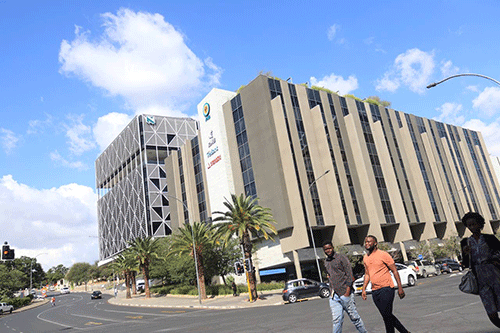Edgar Brandt
Maihapa Ndjavera
Interest income has been the main contributor to profits made in recent years by Namibia’s commercial banks. However, these local commercial banks are definitely not compelled to adjust their interest rates in line with quarterly repo rate changes by the Bank of Namibia (BoN).
Instead, Namibia’s commercial banks actually prefer to alter their interest rates so as not to lose out on the profitable interest margin on some of their deposits.
“The only reason they do so (change interest rates) is that of interest margin. Especially in this competitive banking environment, where banks aren’t lending out as much as they would want to from a credit extension perspective, so they will then potentially lose the interest margin on some of their deposits,” explained a local economic analyst.
Preferring anonymity due to a close association with a major financial services player, the analyst explained: “Their competitors will then make a better margin on interest rates on all loans (mortgage, vehicle asset, etc) if they don’t move with their competitors. They will give depositors ‘discounts’ in other areas, such as the compulsion by the central bank to waive fees on savings deposits, etc”.
The central bank is scheduled to make its third repo rate announcement of the year next week Wednesday, 14 June 2023.
Households bleed
The heads of many Namibian households suffering from sleepless nights brought on by the financial dilemma are pleading for the central bank to apply the brakes to repo rate hikes.
Asking to remain anonymous, a homeowner said she received the keys to her new house towards the middle of last year. However, with the non-stop repo rate hikes since January 2022 she can longer afford to honour the home loan repayments.
“This situation is frustrating; salaries are stagnant but after every few months, your instalments go up. The word ‘repo’ is now scaring us. What I don’t understand is when I knocked on the doors of these banks, they told me I could not afford a particular instalment. But now, with the interest rates, increasing, I am actually paying the amount they initially declined. It is just confusing,” said the concerned homeowner.
She added the current situation is forcing her to live in a compromised financial situation, where she has to cancel some debit orders. Despite these drastic measures, she still does not see light at the end of the tunnel.
Another homeowner, who works for government, stated: “I have felt the impact of repo rate greatly in recent months, such that the thought of another increment is unfathomable. My bond went up from the monthly instalment of N$8 005 to now N$9 387. Although the government subsidy aids, whenever the floating interest rate on the bonds goes up, the cost is carried by the buyer, and it is getting heavier and unbearable”.
Prepare for the worst
BoN is adamant that recent repo rate increases were considered the most appropriate monetary policy stance to continue anchoring inflation and safeguarding the one-to-one peg with the South African Rand.
Also, local stock brokerage Simonis Storm (SS) recently cautioned the ever-increasing interest rate will severely impact the affordability of loans for new buildings, which is anticipated to further deteriorate and contract the already suffering domestic construction industry.
The stock brokerage further anticipates that BoN will increase the repo rate by 25 basis points at the next announcement. If accurate, this would increase the repo rate to 7.50% and the prime interest rate to 11.25% – and as a result, the average home loan interest rate will increase to about 12.25% (prime plus one).
Moreover, the South African Savings Institute, an independent non-profit organisation, recently warned that Namibian consumers should be prepared for the worst.
The Savings Institute’s Gerald Mwandiambia cautioned that homeowners, in particular, will be hardest hit.
“Speak to your financial institution; look at getting an extension on the term. This will reduce your home loan payments – and remember this is a last resort. Salaries are not going up as much as inflation and the cost of living. Most of us are living on 50% of what we were earning in 2018 but servicing the same bills. Anything more than this will lead to an economic recession,” Mwandiambia cautioned.


